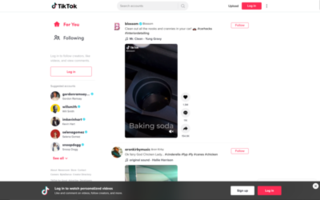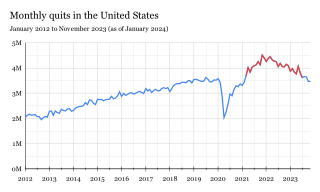Related Research Articles
Work-to-rule, also known as an Italian strike or a slowdown in United States usage, called in Italian a sciopero bianco meaning "white strike", is a job action in which employees do no more than the minimum required by the rules of their contract or job, and strictly follow time-consuming rules normally not enforced. This may cause a slowdown or decrease in productivity if the employer does not hire enough employees or pay the appropriate salary and consequently does not have the requirements needed to run normally.

TikTok, whose mainland Chinese and Hong Kong counterpart is Douyin, is a short-form video hosting service owned by Chinese internet company ByteDance. It hosts user-submitted videos, which can range in duration from three seconds to 60 minutes. It can be accessed with a smart phone app or the web.

E-kids, split by binary gender as e-girls and e-boys, are a youth subculture of Gen Z that emerged in the late 2010s, notably popularized by the video-sharing application TikTok. It is an evolution of emo, scene and mall goth fashion combined with Japanese and Korean street fashion.

Avani Kiana Gregg is an American social media personality who first developed a following on TikTok. She plays Gemma in the web series Chicken Girls. She received the Shorty Award for TikToker of the Year in 2019, and was on the Forbes 30 Under 30 in 2020 in the social media category.

Brittany Alexis Tomlinson, known professionally as Brittany Broski, is an American social media personality, YouTuber, and comedian. She initially gained fame after a video of her tasting kombucha for the first time went viral on TikTok in 2019. She signed to United Talent Agency later that year and has since hosted the TikTok-produced podcast For You (2021), the pop culture-focused podcasts Violating Community Guidelines (2022–2023) with Sarah Schauer and The Broski Report (2023–present), and the YouTube talk show Royal Court (2023–present). She has frequently been referred to as one of TikTok's biggest stars and noted for her meme-focused humor.
Kadie Karen Diekmeyer, popularly known as That Vegan Teacher, is a Canadian animal rights activist, internet personality and former educator, mainly known for promoting veganism. Before she started her online career, Diekmeyer was a nurse and later an ESL teacher but eventually left the latter job at the start of the COVID-19 pandemic. Diekmeyer is known for her TikTok and YouTube accounts that promote veganism. Some of Diekmeyer's content has been controversial, and has prompted accusations of racism and homophobia.

The fashions of the 2020s represent a departure from 2010s fashion and feature a nostalgia for older aesthetics. They have been largely inspired by styles of the late 1990s to mid-2000s, and 1980s. Early in the decade, several publications noted the shortened trend and nostalgia cycle in 2020s fashion. Fashion was also shaped by the COVID-19 pandemic, which had a major impact on the fashion industry, and led to shifting retail and consumer trends.
TikTok food trends are specific food recipes and food-related fads on the social media platform TikTok. This content amassed popularity in 2020 during the COVID-19 pandemic, given that many were inclined to eat at home while simultaneously turning to social media as a form of entertainment. While some TikTok users share their diets and recipes, others expand their brand or image on TikTok through step-by-step videos of easy and popular recipes. Users often refer to food-related content as "FoodTok."
Cheugy is an American neologism coined in 2013 as a pejorative description of lifestyle trends associated with the early 2010s. This aesthetic has been described as "the opposite of trendy" or "trying too hard". The term has been used positively by some who identify with the aesthetic.

The Great Resignation, also known as the Big Quit and the Great Reshuffle, was a mainly American economic trend in which employees voluntarily resigned from their jobs en masse, beginning in early 2021 during the COVID-19 pandemic. Among the most cited reasons for resigning included wage stagnation amid rising cost of living, limited opportunities for career advancement, hostile work environments, lack of benefits, inflexible remote-work policies, and long-lasting job dissatisfaction. Most likely to quit were workers in hospitality, healthcare, and education. In addition, many of the resigning workers were retiring Baby Boomers, who are one of the largest demographic cohorts in the United States.
An Internet aesthetic is a visual art style, fashion style, or music genre accompanied by a subculture that usually originates from the Internet or is popularized on it. Throughout the 2010s and 2020s, online aesthetics gained increasing popularity, specifically on social media platforms, and often were used by people to express their individuality and creativity. They can also be used to create a sense of community and belonging among people who share the same interests. The term aesthetic has been described as being "totally divorced from its academic origins", and is commonly used as an adjective.
Slang used or popularized by Generation Z differs from slang of earlier generations; ease of communication via Internet social media has facilitated its rapid proliferation, creating "an unprecedented variety of linguistic variation".
Drew Tyson Afualo is an American influencer, podcaster, and author. She is known on TikTok for her videos responding to and roasting men with misogynistic and fatphobic viewpoints, often punctuated by her distinctive high-pitched laugh; she had over eight million followers on the platform as of March 2023. Afualo also hosts the podcasts The Comment Section, produced by Brat TV, and Two Idiot Girls with her sister Deison. As an influencer, she has provided red carpet coverage for events like the Black Adam premiere and the 95th Academy Awards.
Corecore is an artistic movement aiming to capture post-2020 sensibilities. A product of youth culture in the 2020s, the corecore aesthetic can largely be found on TikTok, where it juxtaposes various video clips while emotional music plays.

Bed rotting is a phrase from social media wherein a person stays in bed for an entire day without engaging in daily activities and chores. This concept emphasizes taking time to rest, recharge, and enjoy leisure activities like watching TV, reading, or scrolling through social media without the pressure to be productive.
Gyatt is a term from African-American Vernacular English originally used in exclamation, such as "gyatt damn". In the 2020s, the word experienced a semantic shift and gained the additional meaning of "a person, usually a woman, with large and attractive buttocks and sometimes an hourglass figure".
Bare minimum Monday (BMM), also known as minimum effort Monday or minimal Mondays refers to an initiative by employees to do the minimal amount of work necessary on Mondays, which mark the start of the work week. This may also involve starting the work day later and prioritizing self-care activities. In doing so, employees alleviate the stress and anxiety associated with the beginning of the work week by making Mondays more manageable and less overwhelming.
In human resources, resenteeism refers to a form of professional dissatisfaction wherein individuals choose to remain in unfulfilling jobs breeding resentment and a sense of entrapment. This is because they either unable to find a more applicable position, or are concerned about the perceived risks associated with changing employment. Individuals experiencing resenteeism will have poor employee engagement and may appear disillusioned, embittered, miserable, and unhappy. Resenteeism arose following the COVID-19 pandemic and the Great resignation where people reevaluated their work-life balance in the face of cost-of-living increases and is an extension of quiet quitting. Resenteeism is a form of occupational burnout.
Loud quitting refers to a type of employee disengagement in which individuals openly share their discontent, desire for change, and intention to leave. These individuals may refuse to do tasks that they deem unnecessary and by sharing their contempt with colleagues, may spread their disenchantment and disengagement. Loud quitting may arise from perceived workplace inequities, subpar compensation, and an unresponsive employer.
In human resources, rage applying refers to the application to a large number of jobs, typically online, when an employee is fed up with their current role. An individual may be prompted to begin rage applying after they've been denied a promotion or raise, feeling unrecognized, or under appreciated. Rage applying is a response to quiet quitting and may be felt as a form of empowerment or revenge against an employer. Rage applying can also allow an individual to understand their current market value.
References
- ↑ Press-Reynolds, Kieran (2023-07-17). "TikTokers are warning people not to participate in the 'lazy girl jobs' trend and brag about their lax work days so they don't unintentionally out themselves and get fired". Insider. Retrieved 2023-07-24.
- ↑ Judge, Gabrielle (2023-05-22). Career advice for women who don’t know what remote job to apply to. You can bay your bills at not feel tired at the end of the day. Women are here to collect those pay checks and move on from the work day. We have so much more fun stuff happeneing in our 5-9 that is way more important than a boss that you hate (Video) – via TikTok. Retrieved 2023-07-24.
- ↑ Dodgson, Lindsay (2023-06-19). "TikTok's 'anti-work girlboss' is going viral advocating for people to get 'lazy girl jobs'". Insider. Retrieved 2023-07-24.
- ↑ Judge, Gabrielle (2023-07-17). Replying to @Daina Macdonald lazy girl jobs is not offensive. Its a term i coined to promote work life balance in the american hustle culture we live in today. Any one can partake in this workplace trend. Especially not just gen z. (Video) – via TikTok. Retrieved 2023-07-24.
- ↑ O'Connor, Brian (27 January 2022). "The rise of the anti-work movement". BBC. Retrieved 2023-07-26.
- ↑ Cheong, Charissa (2022-10-29). "Step aside, quiet quitters. TikTok wants workers to 'Act Your Wage' instead". Insider. Retrieved 2023-07-24.
- ↑ Kelly, Jack (2022-09-29). "'Acting Your Wage' Is Detrimental To Long-Term Career Success". Forbes. Retrieved 2023-07-24.
- ↑ Abramson, Ashley (January 1, 2022). "Burnout and stress are everywhere". Monitor on Psychology . Vol. 53, no. 1. American Psychological Association. p. 72. Retrieved 2023-07-24.
- ↑ Preston, Camille (January 5, 2021). "Pandemic-Related Burnout". Psychology Today. Retrieved 2023-07-24.
- ↑ Nguyen, Terry (2022-04-11). "Gen Z does not dream of labor". Vox. Retrieved 2023-07-24.
- ↑ Holt, Brianna (2022-12-03). "Why women of color are missing from TikTok's 'stay-at-home girlfriend' trend". Insider. Retrieved 2023-07-24.
- ↑ Kelly, Jack (2022-12-07). "The Rise Of The Stay-At-Home Dad". Forbes. Retrieved 2023-07-24.
- ↑ Zinkula, Jacob (2023-07-13). "If you're happy coasting at your job, you might be in trouble from AI". Insider. Retrieved 2023-07-24.
- ↑ Welch, Suzy (2023-07-23). "Opinion | 'Lazy Girl Jobs' Won't Make Gen Z Less Anxious". Wall Street Journal. ISSN 0099-9660 . Retrieved 2023-07-24.
- ↑ TikTokers Warn Against Posting About 'Lazy Girl Jobs' (Video). The Young Turks. Jul 23, 2023 – via YouTube. retrieved 2023-07-24
- ↑ Zinkula, Jacob (2023-07-11). "Women are posting about their 'lazy girl jobs' on TikTok. They say there's nothing wrong with aspiring for a low-stress job that pays the bills". Insider. Retrieved 2023-07-24.
- ↑ Hampson, Laura (2023-07-24). "'Lazy girl jobs' might just be the secret to work-life balance". Vogue India. Retrieved 2023-07-24.
- ↑ Raisinghani, Vinesh (Sep 12, 2023). "'You can make $60-80k': This TikToker encourages women to find 'lazy girl jobs' — which she defines as something you can 'quiet' quit. Her insight has viewers excited". Moneywise. Retrieved 2023-07-24.